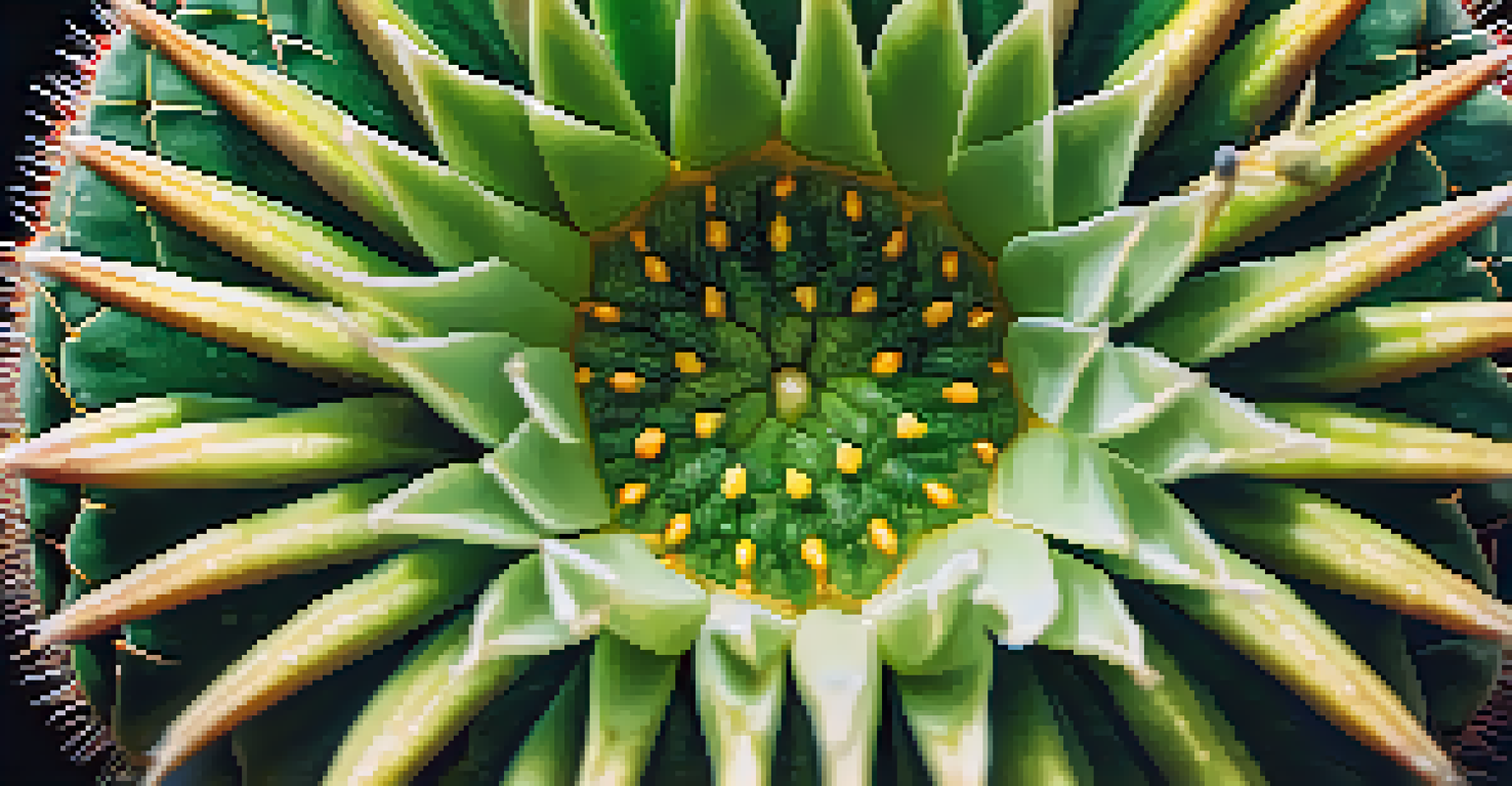The Science Behind Peyote and Coping Mechanisms

Understanding Peyote: A Brief Overview
Peyote is a small cactus native to Mexico and the southwestern United States. It contains mescaline, a psychoactive compound that has been used for centuries in spiritual and healing practices. Traditionally, peyote has been a key element in Native American rituals, serving both as a means of connection to the divine and as a tool for personal introspection.
The use of peyote is a profound journey into the depths of our own consciousness, where we can confront our fears and embrace our true selves.
The use of peyote is deeply intertwined with cultural identity, as many Indigenous communities incorporate it into their ceremonies. These practices emphasize the importance of nature and the interconnectedness of all living beings. This cultural context enriches the experience of peyote, making it more than just a substance; it becomes a pathway to understanding oneself and the universe.
Today, interest in peyote has grown beyond its traditional uses, leading to research on its potential therapeutic benefits. As society seeks alternative coping mechanisms, the science behind peyote and its effects on mental health is garnering attention, opening up discussions about its role in modern wellness.
The Science of Mescaline: How It Works
Mescaline, the primary psychoactive component of peyote, affects neurotransmitters in the brain, particularly serotonin. This interaction can lead to altered perceptions, emotional release, and even vivid visual experiences. Essentially, mescaline can provide users with a different lens through which to view their thoughts and emotions.

Research indicates that mescaline may also promote neuroplasticity, the brain's ability to reorganize itself by forming new neural connections. This ability is crucial for learning, memory, and adapting to new experiences, making mescaline an interesting candidate for therapeutic applications. By potentially enhancing neuroplasticity, peyote may help individuals process trauma or emotional distress more effectively.
Peyote's Cultural Significance
Peyote is not just a substance; it serves as a sacred tool for healing and spiritual growth within Indigenous cultures.
Moreover, studies suggest that psychedelics, including mescaline, can induce a state of heightened mindfulness. This state may allow individuals to confront their fears and anxieties in a safe environment, leading to profound personal insights and emotional healing. As we delve deeper into the science of mescaline, the possibilities for its benefits continue to expand.
Coping Mechanisms: What Are They?
Coping mechanisms are strategies that individuals use to manage stress, anxiety, and emotional pain. They can be thought of as tools that help us navigate life's challenges, whether they're big or small. Some common coping mechanisms include talking to friends, practicing mindfulness, or engaging in physical activities.
Nature is not a place to visit. It is home.
There are two primary types of coping mechanisms: problem-focused and emotion-focused. Problem-focused strategies aim to tackle the source of stress directly, while emotion-focused strategies help manage the feelings surrounding the stress. Understanding these distinctions can aid individuals in selecting the most effective coping methods for their specific situations.
In recent years, there has been a growing interest in alternative coping mechanisms, such as mindfulness practices and psychedelic-assisted therapy. These methods offer new avenues for individuals seeking relief from emotional distress, inviting them to explore their inner landscapes in unique ways.
Peyote as a Coping Mechanism: A Cultural Perspective
For many Indigenous cultures, peyote serves as a sacred tool for healing and spiritual growth. Its use in ceremonial contexts allows individuals to connect with their ancestors and the natural world, fostering a sense of belonging and purpose. The rituals surrounding peyote consumption often emphasize community support, which is a vital aspect of effective coping.
The communal aspect of peyote ceremonies can enhance the coping experience, as individuals share their journeys and insights. This shared understanding creates a safe space for vulnerability and emotional expression, allowing participants to process their experiences together. The collective wisdom gained from these ceremonies can be a powerful resource for navigating life's difficulties.
Potential Mental Health Benefits
Research is exploring how mescaline, the active compound in peyote, may offer therapeutic effects for conditions like depression and PTSD.
Additionally, the spiritual insights gained from peyote experiences can lead to lasting changes in perspective. Many participants report feelings of interconnectedness and clarity that persist long after the experience, helping them to cope with challenges in a more resilient manner.
Modern Research on Peyote and Mental Health
Recent studies have begun to examine the potential therapeutic effects of peyote and mescaline on mental health conditions such as depression and PTSD. Researchers are exploring how these substances can facilitate profound emotional experiences, leading to significant breakthroughs in personal healing. The results of these studies may reshape our understanding of mental health treatment.
One noteworthy aspect of this research is the focus on set and setting, which refers to the mindset of the individual and the environment in which the experience occurs. A supportive and safe environment can enhance the therapeutic effects of peyote, making it crucial for researchers and practitioners to consider these factors in their work.
As more studies emerge, the conversation around peyote and mental health continues to evolve. This body of research not only validates the historical and cultural uses of peyote but also raises important questions about the integration of traditional practices into modern therapeutic frameworks.
Risks and Considerations of Using Peyote
While peyote has potential benefits, it's essential to acknowledge the risks associated with its use. Not everyone may respond positively to peyote; some individuals might experience anxiety or discomfort during their journey. Therefore, it's crucial for those considering peyote as a coping mechanism to be well-informed and prepared for the experience.
Additionally, the legal status of peyote varies by region, making it essential to understand local laws and regulations. In the United States, for example, peyote is legal for use in specific religious ceremonies but remains illegal for recreational use. This legal ambiguity adds a layer of complexity for individuals interested in exploring peyote's potential benefits.
Risks and Legal Considerations
While peyote may provide benefits, it's crucial to be aware of its risks, legal status, and the need for professional guidance.
Moreover, individuals with a history of mental health issues should approach peyote with caution. Consulting with a healthcare professional before engaging with peyote is advisable, as they can provide personalized guidance and ensure that this method aligns with one's overall mental health strategy.
Integrating Peyote into Holistic Coping Strategies
For those who feel drawn to peyote, integrating it into a broader holistic coping strategy can enhance its benefits. This might include combining peyote with practices such as meditation, therapy, or yoga, which can provide additional support for emotional and mental well-being. The goal is to create a balanced approach that addresses both the mind and body.
Building a supportive community is also vital when integrating peyote into coping strategies. Engaging with others who share similar interests can provide encouragement, accountability, and a sense of belonging. This communal support can amplify the positive effects of peyote, helping individuals navigate their journeys with greater confidence.

Ultimately, the integration of peyote as a coping mechanism should be approached with mindfulness and respect. By treating it as part of a larger toolkit for emotional resilience, individuals can harness its potential while ensuring a well-rounded approach to mental health.